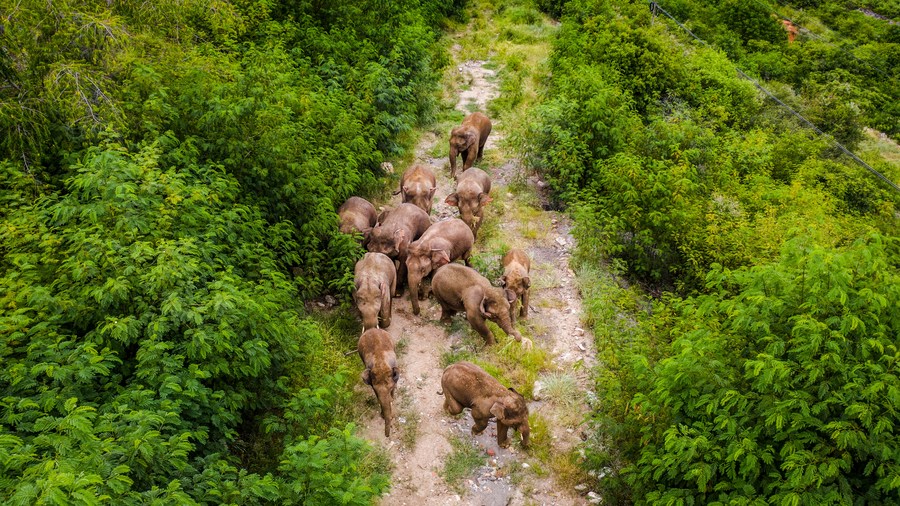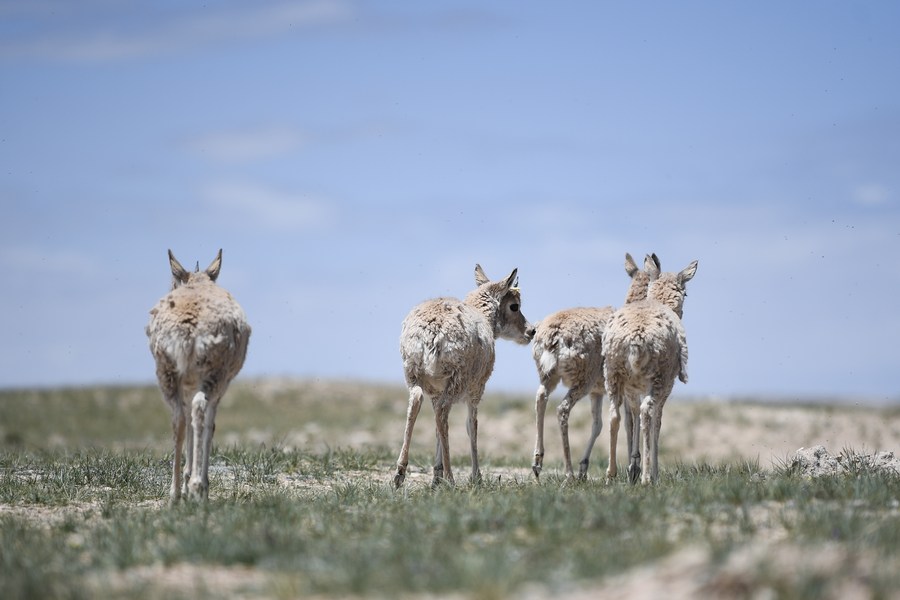Next 10 years "pivotal decade" for nature conservation, China's achievements inspiring, says IUCN President

Aerial photo taken on Aug. 25, 2021 shows a view of the Nianbaoyuze national geology park within the Sanjiangyuan national nature reserve in Jiuzhi County, Golog Tibetan Autonomous Prefecture, northwest China's Qinghai Province. (Xinhua/Zhang Long)
With climate change as its main theme, this Congress of the IUCN, which is composed of some 1,400 governmental and civil society member organizations, also calls itself a "major stepping-stone toward a global agreement for protecting biodiversity."
MARSEILLE, France, Sept. 2 (Xinhua) -- The next 10 years will be a "pivotal decade" in which humanity must take action to battle global warming and save biodiversity, President of the International Union for Conservation of Nature (IUCN) Zhang Xinsheng has told Xinhua.
China's progress in biodiversity protection and ecological governance is inspiring, Zhang said on the eve of the seventh IUCN World Conservation Congress (WCC).
Tens of thousands of participants will come together in Marseille, France, and also online for the Congress from Sept. 3 to 11, to set priorities for conservation and sustainable development action.
PIVOTAL DECADE
With climate change as its main theme, this Congress of the IUCN, which is composed of some 1,400 governmental and civil society member organizations, also calls itself a "major stepping-stone toward a global agreement for protecting biodiversity."

Aerial photo taken on July 22, 2019 shows a Chinese scientific expedition team taking a boat to the main area of Lake Yamzbog Yumco for survey in Shannan, southwest China's Tibet Autonomous Region. (Xinhua/Jigme Dorje)
"The next 10 years will be a pivotal decade," said Zhang. "A core mission of WCC Marseille and the upcoming UN Biodiversity Conference in Kunming, China, is to set the post-2020 framework agenda for biodiversity."
The decade from 2010 to 2020 was called the "UN biodiversity decade," since parties of the Convention on Biological Diversity (CBD) set 20 goals during a summit in Japan's Aichi in 2010. "However, many of the Aichi Biodiversity Targets have been difficult to achieve," Zhang said.
"The degree of biodiversity loss and the degradation of the ecosystem have been approaching planetary limits and tipping points," he said. "If this loss and degradation still cannot be reversed by 2030, we will not be able to achieve the Sustainable Development Goals."
"This IUCN congress can be seen as a prelude to the Kunming Conference. Both are milestones to see whether mankind can set a 10-year agenda to turn crisis into opportunity," said the IUCN president.
Unlike the Kunming Conference, which as a UN convention meeting has the authority to propose global policy agenda, the IUCN congress, which brings together government agencies, non-government organizations and scientists, produces global resolutions which have strong scientific authority and influence on various international conventions and treaties. In this way, IUCN contributes to inclusive governance.
CHINA'S ACHIEVEMENTS INSPIRING
Zhang, who is also co-founder of Eco Foundation Global, a leading Chinese public private partnership organization striving to build global consensus for a green and sustainable future, said that China has achieved a lot and taken an increasingly leading role in nature conservation and ecological governance.
He cited the epic journey of China's wandering elephants, which went viral on social media this summer, as a vivid example.
Wild Asian elephants are under A-level state protection in China. "Thanks to stronger environmental and wildlife protection efforts, the wild elephant population in the country has doubled in the past 30 years to about 300," Zhang noted.

Aerial photo taken on Aug. 9, 2021 shows a herd of wild Asian elephants in Yuanjiang County of Yuxi City, southwest China's Yunnan Province. (Xinhua/Hu Chao)
Earlier this year, a herd of 14 Asian elephants strayed from their nature reserve. Heading north, they wandered some 500 km across southwest China's Yunnan Province before returning to their jungle paradise in August.
During the trip, the elephants crashed into people's houses, munched their crops and guzzled their water. Some 150,000 residents were evacuated, over 180 tonnes of food were provided to the "elephant tourist group" and many vehicles and drones were deployed to monitor and guide their way home.
"Wherever the elephant herd went, people quietly gave way," Zhang said. "Everyone, from villagers who let their crops get trampled or netizens who followed the live cam showed tolerance and love towards this endangered species," said Zhang.
"It was a vivid example of China's achievements in promoting the harmonious coexistence of humans and nature."
The IUCN President also cited the cases of giant panda, whose vulnerability has been downgraded from "endangered" to "vulnerable" on the IUCN list, and Tibetan antelopes, downgraded from "endangered" to "nearly endangered".

Tibetan antelopes are released into the wild at a wildlife rescue center of the Sonam Dargye Protection Station in Hoh Xil, northwest China's Qinghai Province, July 7, 2021. (Xinhua/Zhang Long)
"The downgrades on the Red List show an improvement in protection results," he said. "China has many successful cases."
Zhang said that China has been building an eco-civilization, with effective measures aligned with national context, which reflects Chinese wisdom. Once a follower and contributor in the field of nature conservation, China has now become a leader.
He noted that all provinces in China have drawn up "ecological red lines," and the zones demarcated by the "red lines" have a combined area of up to a quarter of the total land area of the country.
Regarding the climate, "by pledging to achieve carbon peaks by 2030 and carbon neutrality by 2060, China has taken the lead in making commitments for the implementation of the Paris climate agreement," Zhang said.
Photos
 Dance show saluting traditional culture of the Song Dynasty makes its debut
Dance show saluting traditional culture of the Song Dynasty makes its debut Village in SW China’s Yunnan embraces prosperity through agricultural tourism
Village in SW China’s Yunnan embraces prosperity through agricultural tourism Eighth birthday for pair of giant pandas celebrated in Haikou, Hainan province
Eighth birthday for pair of giant pandas celebrated in Haikou, Hainan province Olympic gold medalists portrayed in Shanxi artist’s polymer clay sculptures
Olympic gold medalists portrayed in Shanxi artist’s polymer clay sculptures
Related Stories
Copyright © 2021 People's Daily Online. All Rights Reserved.






